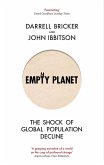How Worlds Collapse
What History, Systems, and Complexity Can Teach Us about Our Modern World and Fragile Future
Herausgeber: Centeno, Miguel; Patterson, Thayer; Larcey, Paul; Callahan, Peter
How Worlds Collapse
What History, Systems, and Complexity Can Teach Us about Our Modern World and Fragile Future
Herausgeber: Centeno, Miguel; Patterson, Thayer; Larcey, Paul; Callahan, Peter
- Gebundenes Buch
- Merkliste
- Auf die Merkliste
- Bewerten Bewerten
- Teilen
- Produkt teilen
- Produkterinnerung
- Produkterinnerung
As our society confronts climate change, authoritarianism, and epidemics, what can examples from the past tell us about our present and future? This book studies societies that either collapsed or overcame cataclysmic adversity, tracing patterns, strategies, and early warning signs that can inform decision making today.
Andere Kunden interessierten sich auch für
![Empty Planet Empty Planet]() Darrell BrickerEmpty Planet11,99 €
Darrell BrickerEmpty Planet11,99 €![Arming Asia Arming Asia]() Richard BitzingerArming Asia220,99 €
Richard BitzingerArming Asia220,99 €![History of the Future History of the Future]() Max SingerHistory of the Future137,99 €
Max SingerHistory of the Future137,99 €![Alternative Societies Alternative Societies]() Luke MartellAlternative Societies136,99 €
Luke MartellAlternative Societies136,99 €![Women in the Politics of Postcommunist Eastern Europe Women in the Politics of Postcommunist Eastern Europe]() Women in the Politics of Postcommunist Eastern Europe197,99 €
Women in the Politics of Postcommunist Eastern Europe197,99 €![Information Communication Technology and Social Transformation Information Communication Technology and Social Transformation]() Hugh F ClineInformation Communication Technology and Social Transformation143,99 €
Hugh F ClineInformation Communication Technology and Social Transformation143,99 €![Dark Machines Dark Machines]() Victor GalazDark Machines198,99 €
Victor GalazDark Machines198,99 €-
-
-
As our society confronts climate change, authoritarianism, and epidemics, what can examples from the past tell us about our present and future? This book studies societies that either collapsed or overcame cataclysmic adversity, tracing patterns, strategies, and early warning signs that can inform decision making today.
Hinweis: Dieser Artikel kann nur an eine deutsche Lieferadresse ausgeliefert werden.
Hinweis: Dieser Artikel kann nur an eine deutsche Lieferadresse ausgeliefert werden.
Produktdetails
- Produktdetails
- Verlag: Taylor & Francis
- Seitenzahl: 426
- Erscheinungstermin: 30. März 2023
- Englisch
- Abmessung: 229mm x 152mm x 25mm
- Gewicht: 757g
- ISBN-13: 9781032363257
- ISBN-10: 1032363258
- Artikelnr.: 66733637
- Herstellerkennzeichnung
- Libri GmbH
- Europaallee 1
- 36244 Bad Hersfeld
- gpsr@libri.de
- Verlag: Taylor & Francis
- Seitenzahl: 426
- Erscheinungstermin: 30. März 2023
- Englisch
- Abmessung: 229mm x 152mm x 25mm
- Gewicht: 757g
- ISBN-13: 9781032363257
- ISBN-10: 1032363258
- Artikelnr.: 66733637
- Herstellerkennzeichnung
- Libri GmbH
- Europaallee 1
- 36244 Bad Hersfeld
- gpsr@libri.de
Miguel A. Centeno is Musgrave Professor of Sociology at Princeton University and Executive Vice Dean of Princeton University's School of Public and International Affairs. He is founder and co-director of the Princeton Institute for International and Regional Studies (PIIRS) Global Systemic Risk research community. Peter W. Callahan is a graduate of Princeton University who earned his MS in Geography and Environmental Studies from the University of New Mexico. He is a researcher at Princeton's PIIRS Global Systemic Risk research community where his scholarly interests include the study of socio-ecological systems, historical systemic risks, sustainable development, and renewable energy policy and technology. Paul A. Larcey is co-director of the PIIRS Global Systemic Risk research community at Princeton University. Larcey's work with the UK's innovation agency focuses on key emerging technologies including life sciences, quantum technologies, and AI. He has worked in corporate research, venture capital, and global industrial sectors at board and senior levels and studied engineering, materials science, and finance at London, Oxford, and Cambridge Universities. Thayer S. Patterson is coordinator and a founding member of the PIIRS Global Systemic Risk research community at Princeton University. Following his studies in economics and mechanical engineering at Yale, and finance at Princeton's Bendheim Center for Finance, his research has focused on the causes and consequences of catastrophic systemic risk.
Introduction
Section 1: Theory and Insights of Historical Collapse
1. Globalization and Fragility: A Systems Approach to Collapse
Miguel A. Centeno, Peter W. Callahan, Paul A. Larcey, and Thayer S.
Patterson
2. How Scholars Explain Collapse
Joseph A. Tainter
3. Diminishing Returns on Extraction: How Inequality and Extractive
Hierarchy Create Fragility
Luke Kemp
4. Collapse, Recovery, and Existential Risk
Haydn Belfield
Section 2: Historical and Archaeological Investigations of Collapse
5. "Mind the Gap": The 1177 BCE Late Bronze Age Collapse and Some
Preliminary Thoughts on Its Immediate Aftermath
Eric H. Cline
6. The End of "Peak Empire": The Collapse of the Roman, Han, and Jin
Empires
Walter Scheidel
7. Collapse and Non-collapse: The Case of Byzantium ca. 650-800 CE
John Haldon
8. Fluctuat Nec Mergitur: Seven Centuries of Pueblo Crisis and Resilience
Timothy A. Kohler, R. Kyle Bocinsky, and Darcy Bird
9. Episodes of the Feathered Serpent: Aztec Imperialism and Collapse
Deborah L. Nichols and Ryan H. Collins
10. The Black Death: Collapse, Resilience, and Transformation
Samuel K. Cohn, Jr
11. The Cases of Novgorod and Muscovy: Using Systems Thinking to Understand
Historical Civilizational Response to Exogenous Threats
Miriam Pollock, Benjamin D. Trump, and Igor Linkov
12. Resilience of the Simple? Lessons from the Blockade of Leningrad
Jeffrey K. Hass
Section 3: Systemic Collapse Insights from Ecology, Climate, and the
Environment
13. Climate Change and Tipping Points in Historical Collapse
Timothy M. Lenton
14. Conservation of Fragility and the Collapse of Social Orders
John M. Anderies and Simon A. Levin
15. Resilience and Collapse in Bee Societies and Communities
Christina M. Grozinger and Harland M. Patch
Section 4: Future Systemic Collapse and Quantitative Modeling
16. Producing Collapse: Nuclear Weapons as Preparation to End Civilization
Zia Mian and Benoît Pelopidas
17. From Wild West to Mad Max: Transition in Civilizations
Richard Bookstaber
18. Phase Transitions and the Theory of Early Warning Indicators for
Critical Transitions
George I. Hagstrom and Simon A. Levin
19. The Lifespan of Civilizations: Do Societies "Age," or Is Collapse Just
Bad Luck?
Anders Sandberg
20. Multipath Forecasting: The Aftermath of the 2020 American Crisis
Peter Turchin
Section 1: Theory and Insights of Historical Collapse
1. Globalization and Fragility: A Systems Approach to Collapse
Miguel A. Centeno, Peter W. Callahan, Paul A. Larcey, and Thayer S.
Patterson
2. How Scholars Explain Collapse
Joseph A. Tainter
3. Diminishing Returns on Extraction: How Inequality and Extractive
Hierarchy Create Fragility
Luke Kemp
4. Collapse, Recovery, and Existential Risk
Haydn Belfield
Section 2: Historical and Archaeological Investigations of Collapse
5. "Mind the Gap": The 1177 BCE Late Bronze Age Collapse and Some
Preliminary Thoughts on Its Immediate Aftermath
Eric H. Cline
6. The End of "Peak Empire": The Collapse of the Roman, Han, and Jin
Empires
Walter Scheidel
7. Collapse and Non-collapse: The Case of Byzantium ca. 650-800 CE
John Haldon
8. Fluctuat Nec Mergitur: Seven Centuries of Pueblo Crisis and Resilience
Timothy A. Kohler, R. Kyle Bocinsky, and Darcy Bird
9. Episodes of the Feathered Serpent: Aztec Imperialism and Collapse
Deborah L. Nichols and Ryan H. Collins
10. The Black Death: Collapse, Resilience, and Transformation
Samuel K. Cohn, Jr
11. The Cases of Novgorod and Muscovy: Using Systems Thinking to Understand
Historical Civilizational Response to Exogenous Threats
Miriam Pollock, Benjamin D. Trump, and Igor Linkov
12. Resilience of the Simple? Lessons from the Blockade of Leningrad
Jeffrey K. Hass
Section 3: Systemic Collapse Insights from Ecology, Climate, and the
Environment
13. Climate Change and Tipping Points in Historical Collapse
Timothy M. Lenton
14. Conservation of Fragility and the Collapse of Social Orders
John M. Anderies and Simon A. Levin
15. Resilience and Collapse in Bee Societies and Communities
Christina M. Grozinger and Harland M. Patch
Section 4: Future Systemic Collapse and Quantitative Modeling
16. Producing Collapse: Nuclear Weapons as Preparation to End Civilization
Zia Mian and Benoît Pelopidas
17. From Wild West to Mad Max: Transition in Civilizations
Richard Bookstaber
18. Phase Transitions and the Theory of Early Warning Indicators for
Critical Transitions
George I. Hagstrom and Simon A. Levin
19. The Lifespan of Civilizations: Do Societies "Age," or Is Collapse Just
Bad Luck?
Anders Sandberg
20. Multipath Forecasting: The Aftermath of the 2020 American Crisis
Peter Turchin
Introduction
Section 1: Theory and Insights of Historical Collapse
1. Globalization and Fragility: A Systems Approach to Collapse
Miguel A. Centeno, Peter W. Callahan, Paul A. Larcey, and Thayer S.
Patterson
2. How Scholars Explain Collapse
Joseph A. Tainter
3. Diminishing Returns on Extraction: How Inequality and Extractive
Hierarchy Create Fragility
Luke Kemp
4. Collapse, Recovery, and Existential Risk
Haydn Belfield
Section 2: Historical and Archaeological Investigations of Collapse
5. "Mind the Gap": The 1177 BCE Late Bronze Age Collapse and Some
Preliminary Thoughts on Its Immediate Aftermath
Eric H. Cline
6. The End of "Peak Empire": The Collapse of the Roman, Han, and Jin
Empires
Walter Scheidel
7. Collapse and Non-collapse: The Case of Byzantium ca. 650-800 CE
John Haldon
8. Fluctuat Nec Mergitur: Seven Centuries of Pueblo Crisis and Resilience
Timothy A. Kohler, R. Kyle Bocinsky, and Darcy Bird
9. Episodes of the Feathered Serpent: Aztec Imperialism and Collapse
Deborah L. Nichols and Ryan H. Collins
10. The Black Death: Collapse, Resilience, and Transformation
Samuel K. Cohn, Jr
11. The Cases of Novgorod and Muscovy: Using Systems Thinking to Understand
Historical Civilizational Response to Exogenous Threats
Miriam Pollock, Benjamin D. Trump, and Igor Linkov
12. Resilience of the Simple? Lessons from the Blockade of Leningrad
Jeffrey K. Hass
Section 3: Systemic Collapse Insights from Ecology, Climate, and the
Environment
13. Climate Change and Tipping Points in Historical Collapse
Timothy M. Lenton
14. Conservation of Fragility and the Collapse of Social Orders
John M. Anderies and Simon A. Levin
15. Resilience and Collapse in Bee Societies and Communities
Christina M. Grozinger and Harland M. Patch
Section 4: Future Systemic Collapse and Quantitative Modeling
16. Producing Collapse: Nuclear Weapons as Preparation to End Civilization
Zia Mian and Benoît Pelopidas
17. From Wild West to Mad Max: Transition in Civilizations
Richard Bookstaber
18. Phase Transitions and the Theory of Early Warning Indicators for
Critical Transitions
George I. Hagstrom and Simon A. Levin
19. The Lifespan of Civilizations: Do Societies "Age," or Is Collapse Just
Bad Luck?
Anders Sandberg
20. Multipath Forecasting: The Aftermath of the 2020 American Crisis
Peter Turchin
Section 1: Theory and Insights of Historical Collapse
1. Globalization and Fragility: A Systems Approach to Collapse
Miguel A. Centeno, Peter W. Callahan, Paul A. Larcey, and Thayer S.
Patterson
2. How Scholars Explain Collapse
Joseph A. Tainter
3. Diminishing Returns on Extraction: How Inequality and Extractive
Hierarchy Create Fragility
Luke Kemp
4. Collapse, Recovery, and Existential Risk
Haydn Belfield
Section 2: Historical and Archaeological Investigations of Collapse
5. "Mind the Gap": The 1177 BCE Late Bronze Age Collapse and Some
Preliminary Thoughts on Its Immediate Aftermath
Eric H. Cline
6. The End of "Peak Empire": The Collapse of the Roman, Han, and Jin
Empires
Walter Scheidel
7. Collapse and Non-collapse: The Case of Byzantium ca. 650-800 CE
John Haldon
8. Fluctuat Nec Mergitur: Seven Centuries of Pueblo Crisis and Resilience
Timothy A. Kohler, R. Kyle Bocinsky, and Darcy Bird
9. Episodes of the Feathered Serpent: Aztec Imperialism and Collapse
Deborah L. Nichols and Ryan H. Collins
10. The Black Death: Collapse, Resilience, and Transformation
Samuel K. Cohn, Jr
11. The Cases of Novgorod and Muscovy: Using Systems Thinking to Understand
Historical Civilizational Response to Exogenous Threats
Miriam Pollock, Benjamin D. Trump, and Igor Linkov
12. Resilience of the Simple? Lessons from the Blockade of Leningrad
Jeffrey K. Hass
Section 3: Systemic Collapse Insights from Ecology, Climate, and the
Environment
13. Climate Change and Tipping Points in Historical Collapse
Timothy M. Lenton
14. Conservation of Fragility and the Collapse of Social Orders
John M. Anderies and Simon A. Levin
15. Resilience and Collapse in Bee Societies and Communities
Christina M. Grozinger and Harland M. Patch
Section 4: Future Systemic Collapse and Quantitative Modeling
16. Producing Collapse: Nuclear Weapons as Preparation to End Civilization
Zia Mian and Benoît Pelopidas
17. From Wild West to Mad Max: Transition in Civilizations
Richard Bookstaber
18. Phase Transitions and the Theory of Early Warning Indicators for
Critical Transitions
George I. Hagstrom and Simon A. Levin
19. The Lifespan of Civilizations: Do Societies "Age," or Is Collapse Just
Bad Luck?
Anders Sandberg
20. Multipath Forecasting: The Aftermath of the 2020 American Crisis
Peter Turchin








